Exploring the History and Culture of German Beer Festivals
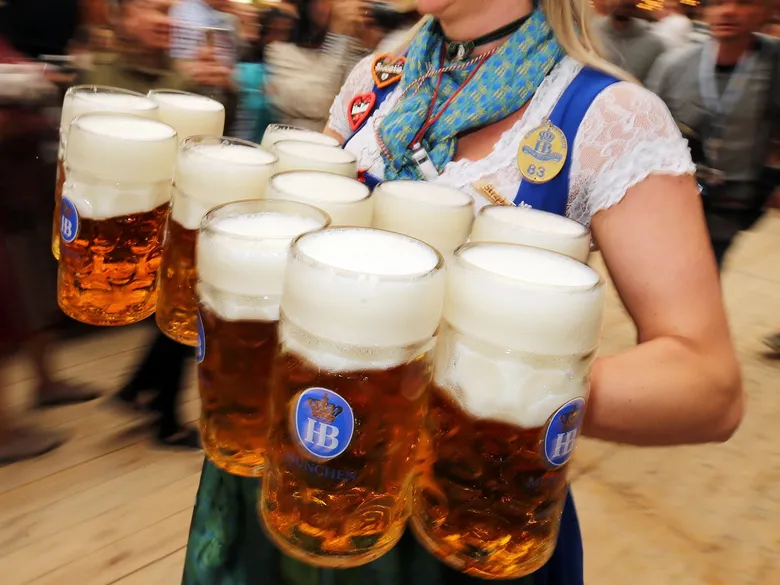
Let’s take a trip through the colorful culture and famous history of German beer festivals, including the complete guide to Oktoberfest Munich. More than merely a celebration of the beverage, Germany’s beer festivals serve as a reminder of the nation’s history, traditions, and the warm spirit of Gemütlichkeit.
Brewing Traditions: A Historical Overview
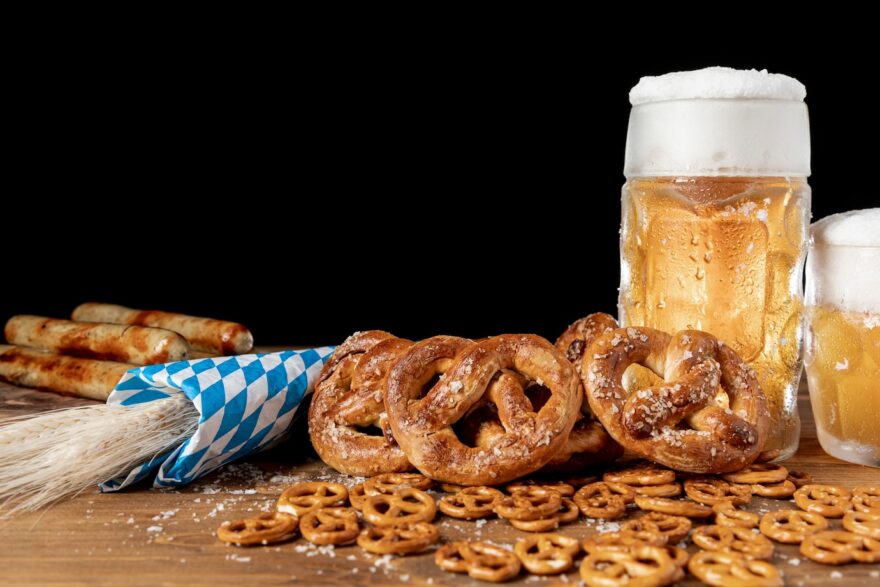
Germany’s love affair with beer, as detailed in the complete guide to Oktoberfest Munich, is deeply rooted in its history. The country’s beer-making traditions can be traced back over a thousand years. Monasteries played a significant role in brewing during the Middle Ages, perfecting the art and science of beer production. By the 16th century, brewing had become a regulated trade, leading to the creation of the German Beer Purity Law (Reinheitsgebot) in 1516, which stipulated that beer could only be brewed with barley, hops, and water (yeast was later added when its role in fermentation became understood).
Gemütlichkeit: The Heart of Beer Culture
At the core of German beer culture lies the concept of “Gemütlichkeit,” a term that embodies coziness, sociability, and a warm atmosphere. It’s the feeling of contentment that envelops you when sharing a beer with friends and strangers alike. This sense of Gemütlichkeit is a hallmark of German beer festivals, where people from all walks of life come together to enjoy the camaraderie that beer fosters.
Oktoberfest: The Grand Celebration
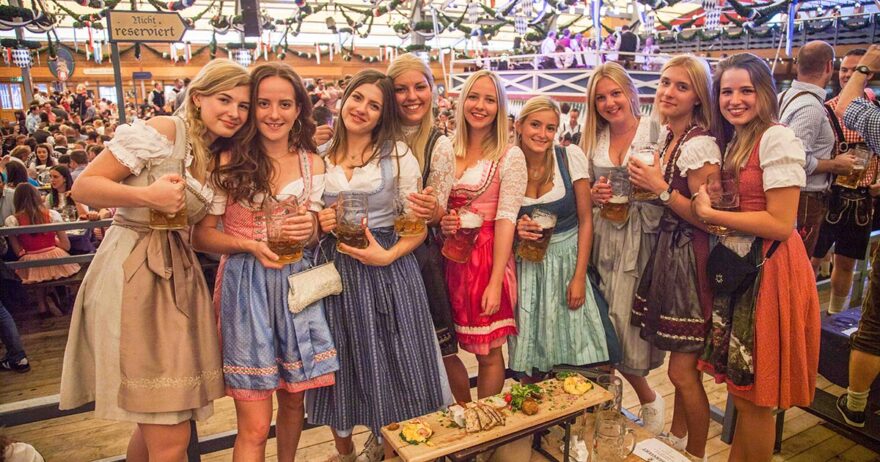
Oktoberfest, often referred to as the “Wiesn” by locals, is the granddaddy of all German beer festivals and the world’s largest folk festival. It originated in Munich in 1810 as a celebration of Bavarian Crown Prince Ludwig’s marriage to Princess Therese of Saxe-Hildburghausen. It now draws millions of tourists from throughout the world. Beyond the beer tents and steins, Oktoberfest offers a colorful array of attractions, including amusement rides, live music, traditional Bavarian food, and parades.
The Beer Styles: A World of Variety
While beer in Germany is governed by the Reinheitsgebot, there is no shortage of variety when it comes to beer styles. Each region of Germany has its own beer traditions and specialties. For instance, in Bavaria, you’ll find the world-famous Weissbier (wheat beer) and strong, malty Doppelbocks. In Cologne, Kölsch, a light and crisp ale, is the beer of choice. Northern Germany boasts refreshing Pilsners, while in the east, you can savor the unique flavors of Berliner Weisse.
Beyond Oktoberfest: Regional Beer Festivals
Germany’s beer festival calendar extends far beyond Oktoberfest. Throughout the year, various regions host their own celebrations of beer. Stuttgart Beer Festival (Cannstatter Volksfest) is the second-largest beer festival in Germany, featuring a lively atmosphere and a massive beer tent known as the “Wasen.” In Bamberg, the Sandkerwa is famous for its local specialty, Rauchbier (smoked beer). Each of these regional festivals offers a unique experience, showcasing local beer styles and culinary delights.
The Role of Traditional Costumes
Traditional Bavarian attire, such as Lederhosen for men and Dirndls for women, plays a prominent role in German beer festivals. These outfits are more than just clothing; they are a representation of cultural pride and history. Lederhosen were originally designed for the working class, and Dirndls were inspired by the clothing of Alpine peasants. Today, they are donned by both locals and visitors, adding to the festive ambiance of beer festivals.
The Food: Complementing the Brews
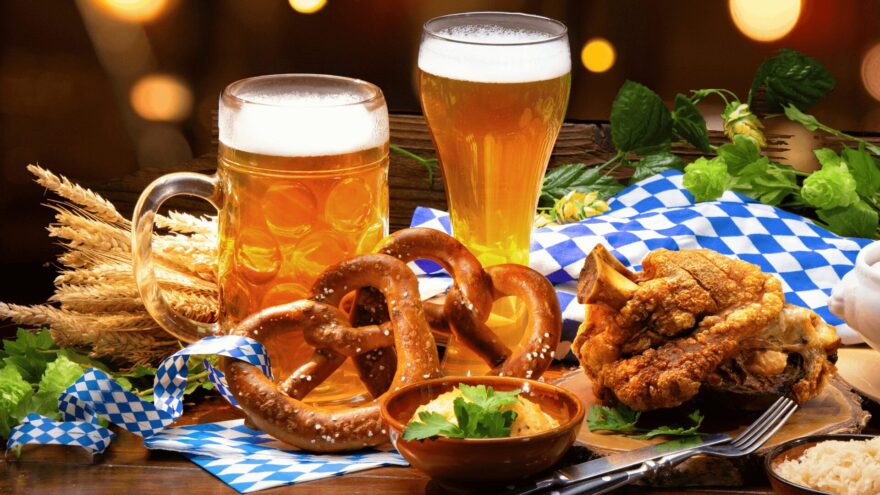
German beer festivals are not just about beer; they are also a celebration of hearty, delicious food. Traditional dishes like sausages, pretzels, roast chicken, and sauerkraut are staples at these events. The culinary offerings are carefully selected to complement the diverse range of beer styles, creating a symphony of flavors that tantalize the taste buds.
Music and Entertainment
Live music and entertainment are integral to the atmosphere of German beer festivals. Oompah bands, traditional folk music, and modern cover bands all have their place in the beer tents. The lively tunes encourage revelers to sing, dance, and sway their steins in unison, creating an electric atmosphere of joy and celebration.
Beer Festival Etiquette
Participating in a German beer festival comes with its own set of customs and etiquette. It’s essential to understand the protocol for reserving tables, ordering beer, and even navigating the restroom facilities. Knowing these nuances enhances your experience and helps you blend in with the locals, fostering a sense of camaraderie.
Beyond Beer: Non-Alcoholic Options
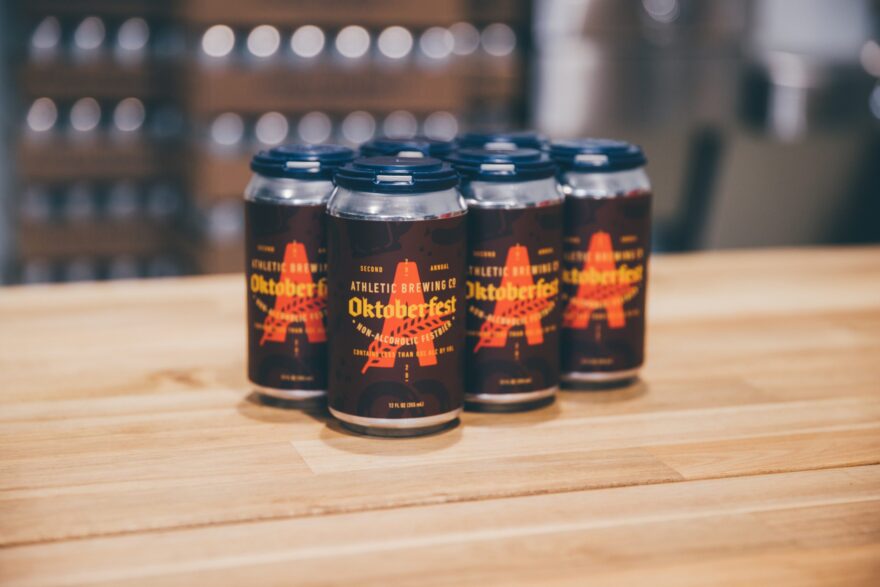
While beer is undoubtedly the star of the show at German beer festivals, there are non-alcoholic options for those who prefer to abstain. Radler, a mixture of beer and lemonade, is a popular choice, as is Spezi, a blend of cola and orange soda. Additionally, many festivals offer alcohol-free beer, ensuring that everyone can raise a glass and join in the cheers.
Sustainability and Environmental Efforts
In recent years, sustainability has become an increasingly important aspect of German beer festivals. Organizers are implementing eco-friendly practices, such as reusable cups, waste separation, and energy-efficient lighting, to minimize their environmental footprint. These efforts align with Germany’s commitment to environmental conservation.
Conclusion
German beer festivals are a vibrant tapestry of history, culture, and tradition. They offer a unique opportunity to immerse yourself in Gemütlichkeit, sample a diverse range of beer styles, savor delicious food, and enjoy live music in the company of friends and fellow revelers. Whether you’re attending the world-famous Oktoberfest in Munich or exploring regional beer festivals, the experience is a celebration of life, community, and the joy of raising a stein in good company. Prost!

